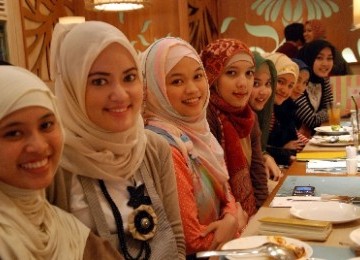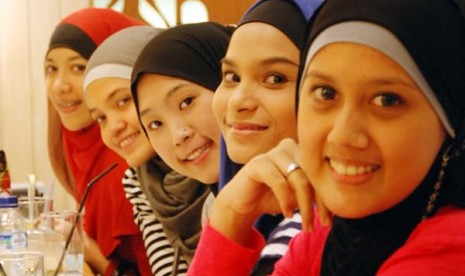How should he deal with his sisters who do not wear full hijab?
I am a young man who was guided by Allaah – all praise be to Him – four months ago. I am surprised at all the bid’ahs that the people follow, hence I visit this site of yours all the time. I live in a family where all the people pray, praise be to Allaah. I have two sisters aged 14 and 16. They do not wear jilbaabs, rather they just cover their heads. When I try to convince them to wear jilbaab my mother stands in my way even though she wears jilbaab herself, and she tells me that when they grow up we will make them wear jilbaab. I adhere to the command in the Qur’aan to respect our parents, so I keep quiet.
I want to ask:
1 – Should I keep quiet and wait till my sisters grow up?
2 – Should I go against my parents and make my sisters wear the jilbaab, especially since my parents are strongly opposed to this idea at present ?
Please advise me, because I am confused. May Allaah reward you with all good.
---------------------------------------------------------------------
Praise be to Allaah.
We ask Allaah to continue to guide you and to increase your faith, and to make us and you steadfast in adhering to His religion.
You should continue advising your sisters to wear the jilbaab, and advise your parents to make them adhere to the command of Allaah. But you should do that in a kind and gentle manner, and perhaps you can use some tapes and booklets that explain the ruling on the jilbaab, which is enjoined in the verse (interpretation of the meaning):
“O Prophet! Tell your wives and your daughters and the women of the believers to draw their cloaks (veils) all over their bodies (i.e. screen themselves completely except the eyes or one eye to see the way). That will be better, that they should be known (as free respectable women) so as not to be annoyed. And Allaah is Ever Oft-Forgiving, Most Merciful”
[al-Ahzaab 33:59]
Al-Qurtubi (may Allaah have mercy on him) said:
It was the custom of the Arab women to be uncovered. They used to uncover their faces as slave woman do, which prompted men to look at them and provoked desires in them. So Allaah commanded His Messenger (peace and blessings of Allaah be upon him) to tell them put on their jilbaabs when they went out, if they wanted to go out to relieve themselves, because they used to go out into the desert before they began to use chamber pots. This was in order to distinguish between them and slave woman, so that free woman would be recognized by their covering, and no one would harass them. Before this verse was revealed, believing women would go out for their needs and the evildoers would think that they were slave women, so they would harass them, and the free women would should at them. They complained about that to the Prophet (peace and blessings of Allaah be upon him), and this verse was revealed for that reason. This was said by al-Hasan and others.
See also question no. 11774.
What some people say, that a girl does not have to wear the hijab or jilbaab until after she is married or until she has completed her education etc has no basis, rather this shar’i ruling applies to every girl who has reached the age of adolescence, whether she is 12 years old or 18 or whatever. See question no. 20475.
Fathers and mothers should note that they are responsible before Allaah for the affairs of their daughters that have been entrusted to them, as Allaah says (interpretation of the meaning):
“O you who believe! Ward off yourselves and your families against a Fire (Hell) whose fuel is men and stones, over which are (appointed) angels stern (and) severe, who disobey not, (from executing) the Commands they receive from Allaah, but do that which they are commanded”
[al-Tahreem 66:6]
And as the Prophet (peace and blessings of Allaah be upon him) said: “Each of you is a shepherd and each of you is responsible for his flock. The ruler is a shepherd and is responsible for his flock; the man is the shepherd of his family members and is responsible for them...”
Narrated by al-Bukhaari, 853; Muslim, 1829.
And he (peace and blessings of Allaah be upon him) said: “Allaah will ask every person in a position of responsibility about that which was entrusted to him, whether he took care of it or was negligent, until He will ask a man about the members of his household.” Narrated by Ibn Hibbaan, classed as saheeh by al-Albaani in Ghaayat al-Maraam, no. 271.
And Allaah knows best.
Islam Q&A
I am a young man who was guided by Allaah – all praise be to Him – four months ago. I am surprised at all the bid’ahs that the people follow, hence I visit this site of yours all the time. I live in a family where all the people pray, praise be to Allaah. I have two sisters aged 14 and 16. They do not wear jilbaabs, rather they just cover their heads. When I try to convince them to wear jilbaab my mother stands in my way even though she wears jilbaab herself, and she tells me that when they grow up we will make them wear jilbaab. I adhere to the command in the Qur’aan to respect our parents, so I keep quiet.
I want to ask:
1 – Should I keep quiet and wait till my sisters grow up?
2 – Should I go against my parents and make my sisters wear the jilbaab, especially since my parents are strongly opposed to this idea at present ?
Please advise me, because I am confused. May Allaah reward you with all good.
---------------------------------------------------------------------
Praise be to Allaah.
We ask Allaah to continue to guide you and to increase your faith, and to make us and you steadfast in adhering to His religion.
You should continue advising your sisters to wear the jilbaab, and advise your parents to make them adhere to the command of Allaah. But you should do that in a kind and gentle manner, and perhaps you can use some tapes and booklets that explain the ruling on the jilbaab, which is enjoined in the verse (interpretation of the meaning):
“O Prophet! Tell your wives and your daughters and the women of the believers to draw their cloaks (veils) all over their bodies (i.e. screen themselves completely except the eyes or one eye to see the way). That will be better, that they should be known (as free respectable women) so as not to be annoyed. And Allaah is Ever Oft-Forgiving, Most Merciful”
[al-Ahzaab 33:59]
Al-Qurtubi (may Allaah have mercy on him) said:
It was the custom of the Arab women to be uncovered. They used to uncover their faces as slave woman do, which prompted men to look at them and provoked desires in them. So Allaah commanded His Messenger (peace and blessings of Allaah be upon him) to tell them put on their jilbaabs when they went out, if they wanted to go out to relieve themselves, because they used to go out into the desert before they began to use chamber pots. This was in order to distinguish between them and slave woman, so that free woman would be recognized by their covering, and no one would harass them. Before this verse was revealed, believing women would go out for their needs and the evildoers would think that they were slave women, so they would harass them, and the free women would should at them. They complained about that to the Prophet (peace and blessings of Allaah be upon him), and this verse was revealed for that reason. This was said by al-Hasan and others.
See also question no. 11774.
What some people say, that a girl does not have to wear the hijab or jilbaab until after she is married or until she has completed her education etc has no basis, rather this shar’i ruling applies to every girl who has reached the age of adolescence, whether she is 12 years old or 18 or whatever. See question no. 20475.
Fathers and mothers should note that they are responsible before Allaah for the affairs of their daughters that have been entrusted to them, as Allaah says (interpretation of the meaning):
“O you who believe! Ward off yourselves and your families against a Fire (Hell) whose fuel is men and stones, over which are (appointed) angels stern (and) severe, who disobey not, (from executing) the Commands they receive from Allaah, but do that which they are commanded”
[al-Tahreem 66:6]
And as the Prophet (peace and blessings of Allaah be upon him) said: “Each of you is a shepherd and each of you is responsible for his flock. The ruler is a shepherd and is responsible for his flock; the man is the shepherd of his family members and is responsible for them...”
Narrated by al-Bukhaari, 853; Muslim, 1829.
And he (peace and blessings of Allaah be upon him) said: “Allaah will ask every person in a position of responsibility about that which was entrusted to him, whether he took care of it or was negligent, until He will ask a man about the members of his household.” Narrated by Ibn Hibbaan, classed as saheeh by al-Albaani in Ghaayat al-Maraam, no. 271.
And Allaah knows best.
Islam Q&A























